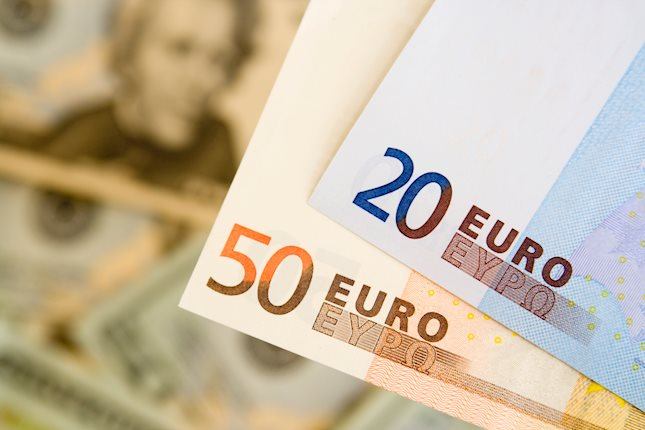Today, we have an all-important ECB meeting and as we get close to the decision timings, here are the expectations as forecasted by the economists and researchers of 8 major banks for the upcoming meet.
Most of the researchers and economists expect the ECB to announce another recalibration of QE this week, but at the same time suggest that it looks very unlikely that the ECB will announce an end date for QE any time soon.
Nomura
“The ECB has made it clear that it will be actively debating its QE exit strategy at the 13 June meeting. But while it is admittedly a very close call, we are not expecting a concrete announcement on this strategy to be made this month, and instead expect it to be delayed to the July meeting.”
“Currently, we expect the ECB to announce in July that will reduce its asset purchases to EUR20bn in October, EUR10bn in November and stop in December. We then expect a first hike in the deposit rate in September 2019. The key considerations that will frame the ECB’s decision-making at this meeting concern: 1) more disappointing growth data; 2) some better-than-expected news on the inflation front; and 3) the flare-up of political and financial instability in Italy. We do not, however, expect any of these factors to yield major changes to the ECB’s outlook.”
“Some very modest downgrades to the GDP outlook for 2018 are likely to be counter-balanced by a modest raising of headline inflation forecasts (for both 2018 and 2019). Also, we see a small risk that the inflation outlook for 2020 might be revised up. The reasons for the latter, however, lie more in oil price and exchange rate-related considerations rather than heightened confidence that inflation will meet the ECB’s medium-term target level. Indeed, we think forecasts for core inflation are likely to be left unchanged.”
ING
“We still don’t think the ECB will easily give away flexibility and room for manoeuvre on QE in a situation where downside risks to the economic outlook have increased and political risks (be it from Italy or later this year from Brexit) could easily re-emerge.”
“Against this background, it looks very unlikely the ECB will announce an end date for QE any time soon. Keeping in mind that Peter Praet will put a policy proposal on the table, we expect the ECB to announce another recalibration of QE already this week, i.e. an extension of QE at a reduced pace of 10bn euro per month at least until December 2018. This would follow the pattern of the first recalibration of QE from 80bn euro to 60bn euro, which was announced three months in advance. Whether the ECB is getting cold feet and wants to unwind QE before it gets too late or whether it simply wants to prove that it is entirely focused on macro facts is still unclear.”
Deutsche Bank
“Peter Praet’s speech last week means that no one will be able to claim surprise if the ECB announce the end of QE today.”
“It is difficult to dispute the signal in Praet’s comments but the question is not whether an exit decision is close but what could stall the decision temporarily. His note runs through two dovish scenarios. In the first scenario the ECB judges the exit criteria to be met but stalls the exit decision for a couple of months to confirm the criteria are being met sustainably. In the second the ECB stalls for input from the internal committees on the post-QE policy stance.”
“The ECB has tended to smooth exit decisions with dovish counterbalances and in his speech Praet underlined again the importance of reinvestments and a recalibration of forward guidance post-QE.”
“The QE exit decision will be made in July but caveats that it’s a very close call. Irrespective, he still believes that QE will end in December after a taper in Q4 followed by a first policy rate hike in June 2019. Anyway we’ll know more this afternoon with the meeting due at 12.45pm BST followed shortly after by Mario Draghi’s press conference.”
Rabobank
“Even if the ECB needs until July for the final details, we expect a very clear ‘preannouncement’ today – i.e. by already outlining the broader framework for future policy, or by discussing the few options that the Governing Council is currently actively considering. That should leave markets with enough information to interpret what lies ahead.”
“The staff projections for headline inflation will likely be revised up by a notch or two. However, we believe that this has less to do with wage developments and more with the increased oil prices and the recent depreciation of the euro. Assuming that the staff projections use a similar cut-off date as the average of the prior three years, we estimate that the ECB’s new projections will be based on an oil price of USD 74/bbl for 2018, as opposed to USD 65/bbl in the March SPF.”
“To summarise, we thus expect Mr. Draghi to announce that discussions on the endgame of the asset purchase programme have started in earnest, with a definitive announcement on the ECB’s new strategy to follow in July. We believe that most Council members –including the doves– are now supportive of stopping the net asset purchases by the end of the year. Instead, the more dovish members will most likely start to campaign for a slower hiking cycle, clearer forward guidance, and/or a fresh round of TLTROs further down the road.”
TDS
“The June ECB decision will see Draghi having to balance growth downgrades, headline inflation upgrades, peripheral tensions, and setting expectations for eventually winding down QE. Draghi will need to strike a delicate tone in still expressing enough confidence in the recovery to justify an eventual end to QE, while acknowledging growing downside risks to the outlook.”
“We believe that the ECB will delay the decision on QE post-September to the July meeting, much like the ECB did last year in discussing various scenarios in September, but not announcing its final decision on QE until October. There are several good reasons why it makes more sense to delay the decision for another few weeks.”
Danske Bank
“We do not expect explicit new forward guidance, but may see some hawkish bits, in particular in wage growth discussions along the lines of ECB's chief economist Peter Praet's comments on Wednesday, which were surprisingly hawkish.”
“Draghi will face numerous questions on an (upcoming) change in forward guidance. Just as Draghi referred to tasked committees when lowering the APP purchase rate from EUR80bn to EUR60bn and EUR60bn to EUR30bn, we could envisage him using a similar reference while waiting for the July meeting.”
“While we expect forward guidance to be changed in July, we cannot rule out the possibility of it coming already this week given the recent comments from Praet. In our view, we have not received any data that should warrant the ECB moving already now. The ECB's actions, which were confirmed in March, have been reactive when removing stimuli and not proactive. In our view, a change to the forward guidance next week would also question the mantra of ECB being reactive.”
“Should APP guidance change this week, we expect the ECB to step up its rhetoric on rates, reinforcing the depo rate guidance. We expect growth to be revised down by 0.2pp and inflation to be revised up by 0.2pp in 2018. We do not look for big changes in the core inflation forecast.”
Nordea Markets
“New signals from the ECB, most importantly from Chief Economist Praet, suggest the ECB is close to pulling the plug on the asset purchase programme (in net terms).”
“The decision could come already next week, though we find July a slightly more likely timing.”
“We expect a tapering announcement to be packaged with dovish guidance on rates, and still expect the first rate hike only in December 2019.”
“Some of the hawkish market positions taken ahead of the tapering announcement are likely to be reversed after the fact.”
Westpac
“These are certainly interesting times for Europe. The past month has shown that the region's political instability is certainly not behind it. In addition, in early 2018, the economy has looked decidedly more fragile than anticipated. For policy makers, this calls for restraint. The awkward point however is that this is all occurring at a time when the market is desperate for guidance on the ECB's intended tightening of policy: first an end to the asset purchase program; then, at some stage, a rate hike(s). Recent comments by Council members imply discussions will be had at the June meeting, though (as evinced by the past) this does not mean detail will soon be forthcoming to the public. Look for loose guidance on the path forward at this press conference, followed by a concrete plan by September.”
Information on these pages contains forward-looking statements that involve risks and uncertainties. Markets and instruments profiled on this page are for informational purposes only and should not in any way come across as a recommendation to buy or sell in these assets. You should do your own thorough research before making any investment decisions. FXStreet does not in any way guarantee that this information is free from mistakes, errors, or material misstatements. It also does not guarantee that this information is of a timely nature. Investing in Open Markets involves a great deal of risk, including the loss of all or a portion of your investment, as well as emotional distress. All risks, losses and costs associated with investing, including total loss of principal, are your responsibility. The views and opinions expressed in this article are those of the authors and do not necessarily reflect the official policy or position of FXStreet nor its advertisers. The author will not be held responsible for information that is found at the end of links posted on this page.
If not otherwise explicitly mentioned in the body of the article, at the time of writing, the author has no position in any stock mentioned in this article and no business relationship with any company mentioned. The author has not received compensation for writing this article, other than from FXStreet.
FXStreet and the author do not provide personalized recommendations. The author makes no representations as to the accuracy, completeness, or suitability of this information. FXStreet and the author will not be liable for any errors, omissions or any losses, injuries or damages arising from this information and its display or use. Errors and omissions excepted.
The author and FXStreet are not registered investment advisors and nothing in this article is intended to be investment advice.
Recommended content
Editors’ Picks

EUR/USD stays near 1.0400 in thin holiday trading
EUR/USD trades with mild losses near 1.0400 on Tuesday. The expectation that the US Federal Reserve will deliver fewer rate cuts in 2025 provides some support for the US Dollar. Trading volumes are likely to remain low heading into the Christmas break.

GBP/USD struggles to find direction, holds steady near 1.2550
GBP/USD consolidates in a range at around 1.2550 on Tuesday after closing in negative territory on Monday. The US Dollar preserves its strength and makes it difficult for the pair to gain traction as trading conditions thin out on Christmas Eve.

Gold holds above $2,600, bulls non-committed on hawkish Fed outlook
Gold trades in a narrow channel above $2,600 on Tuesday, albeit lacking strong follow-through buying. Geopolitical tensions and trade war fears lend support to the safe-haven XAU/USD, while the Fed’s hawkish shift acts as a tailwind for the USD and caps the precious metal.

IRS says crypto staking should be taxed in response to lawsuit
In a filing on Monday, the US International Revenue Service stated that the rewards gotten from staking cryptocurrencies should be taxed, responding to a lawsuit from couple Joshua and Jessica Jarrett.

2025 outlook: What is next for developed economies and currencies?
As the door closes in 2024, and while the year feels like it has passed in the blink of an eye, a lot has happened. If I had to summarise it all in four words, it would be: ‘a year of surprises’.

Best Forex Brokers with Low Spreads
VERIFIED Low spreads are crucial for reducing trading costs. Explore top Forex brokers offering competitive spreads and high leverage. Compare options for EUR/USD, GBP/USD, USD/JPY, and Gold.